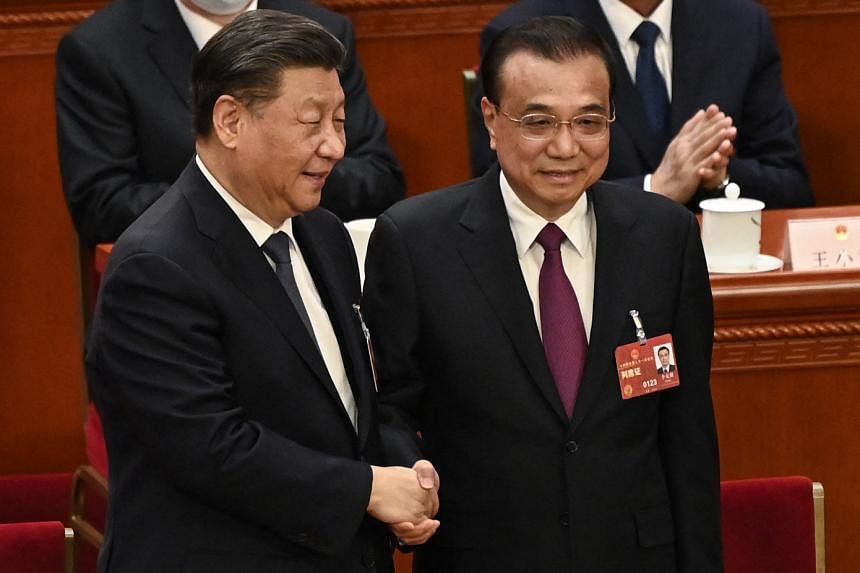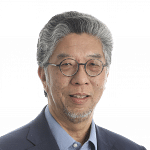BEIJING – Mr Li Keqiang, who died of a heart attack in Shanghai on Friday at 68, had served as premier for a decade until March, in the shadow of President Xi Jinping.
As the second highest-ranked official in the country after the President, he was supposed to be in charge of the Chinese economy, the second-largest in the world, and he was, for the first few years of his two five-year terms in office.
He had already earned his economic chops by then, having significantly improved the economies of the two provinces he had headed earlier – Henan and Liaoning. He also had a PhD in economics from the prestigious Peking University and a first degree in law from the same institution.
But increasingly as premier, Mr Li found himself shunted aside by his erstwhile political rival, Mr Xi, who had begun concentrating power in his own hands after taking over the reins of the Communist Party of China (CPC) and the military in 2012.
By the time Mr Li left office, he had little say over economic policy-making, which had been given over to Mr Xi’s trusted ally, the Harvard-trained Vice-Premier Liu He, in 2018.
Likonomics
When the Xi-Li administration took over the reins of the party in 2012 and the government in 2013, China’s economy was on a downward slide with mounting debt and severe industrial overcapacity left behind by the huge economic stimulus of the previous administration to counter the global financial crisis of 2008-09.
Mr Li set about rescuing the economy with his signature Likonomics, a three-prong approach of debt reduction, no more stimulus and structural reforms.
He focused his attention on government austerity, a more equitable distribution of income and moving towards a consumption-based economy instead of relying on export-led growth.
Likonomics, a term coined in late 2013 by British investment adviser Barclays Capital, had limited success, hampered by dwindling export demand and global economic pressures which led to lower-than-expected growth.
In defence of Mr Li, a retired government official who requested anonymity said: “He was the only (Chinese) premier with a PhD in economics, and truly understood the economy.
“He was competent and worked hard, but had no outstanding achievements because he faced difficult challenges,” the source told The Straits Times, referring to the trade war with the United States and the Covid-19 pandemic.
But Mr Li also faced internal political obstacles, including in November 2013 when Mr Xi set up the Leading Group on Comprehensively Deepening Reforms and made himself the head of the powerful group.
Likonomics fizzled out in 2014.
But Mr Li did not give up.
He cut taxes on small and medium-sized enterprises, upgraded infrastructure in penurious urban areas, built more railway lines in the hinterland and fought pollution.
“He always struck me as very committed to China’s development,” Mr Bert Hofman, director of National University of Singapore’s East Asian Institute, wrote in his post on X, formerly Twitter.
Mr Li was “intellectually curious, with a highly sophisticated understanding of the Chinese economy and how China could learn from international good practice in economic management”, added Mr Hofman.
In May 2015, Mr Li teamed up with Mr Xi to initiate the “Made in China 2025” strategy to identify and indigenise key technologies, such as aerospace, artificial intelligence, biotech, electric vehicles, 5G and semiconductors.
But “Made in China 2025” and the “Thousand Talents Programme” to reverse decades of brain drain and recruit overseas experts in science and technology alarmed the US and its Western allies, which have accused China of intellectual property theft and espionage.
Still, China saw significant economic growth in the past decade.
Its gross domestic product went from about half to more than 70 per cent of the US’, and its GDP per capita has nearly doubled, bringing it close to what the World Bank defines as a high-income country.
Mr Li also promoted what he described as “mass entrepreneurship and innovation”.
In 2015, he introduced his “Internet Plus” policy, aimed at driving economic growth through integrating the Internet, cloud networking and big data with traditional industries to foster new businesses.
He spearheaded Mr Xi’s poverty alleviation programme to eradicate extreme poverty which was announced a success in 2021.
However, Mr Li sparked a debate on income inequality in May 2020, when he said that 600 million people in China earned less than the equivalent of US$140 (S$192) per month, meaning many Chinese were still finding it difficult to make ends meet.
In June 2020, he asked for the return of street vendors – China had been on a campaign to clean up its city streets by prohibiting street hawking – to help people laid off during the Covid-19 pandemic to make a living. He called street vending a “life force” of China.
Would-be president
Mr Li, the son of a local official in Anhui province’s Dingyuan county, began his political career in the youth movement of the CPC, the Communist Youth League of China (CYL).
It was there that he came to the notice of Mr Hu Jintao, who headed the CYL in the mid-1980s and would go on to become president.
Indeed, Mr Li was once considered a potential successor to Mr Hu, but lost out in the contest to Mr Xi.
In 2007, ahead of the 17th party congress, a succession stand-off between Mr Xi and Mr Li was resolved after informal backroom straw polls – known in Chinese as “democratic recommendation” – to sound out the party elite during a meeting of the roughly 200-member Central Committee and party elders.
Mr Xi came out on top in the straw polls and was elevated to the 17th Politburo Standing Committee – the pinnacle of power in China – together with Mr Li but ranked ahead of the latter.
What would a Li presidency have been like?
If Mr Li, an economic liberal compared with Mr Xi, had become president, he would have introduced more market-oriented reforms and Chinese society would have been more open.
However, chronic corruption would likely have worsened under Mr Li as he lacked the political clout of Mr Xi, a princeling, to go after corrupt officials the way the President has done.
Mr Li’s death is unlikely to impact the Chinese economy. But security will be tightened to prevent history from repeating itself.
In 1989, university students flocked to Tiananmen Square to mourn the death in April of liberal party general secretary Hu Yaobang two years after he was purged by the Old Guard. The mourning morphed into pro-democracy protests that the military crushed on June 4.
As for Mr Li’s legacy, he certainly thought he acquitted himself well as premier despite the obstacles he faced.
Hinting that he had tried his best and that his conscience was clear, Mr Li said in his parting words in March: “What people do, heaven watches. And heaven has eyes.”
- Additional reporting by Lim Min Zhang


